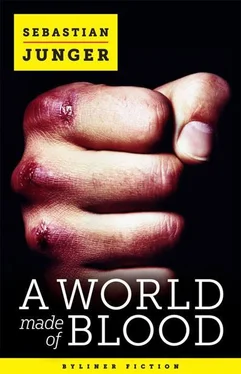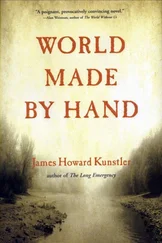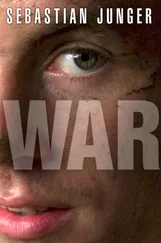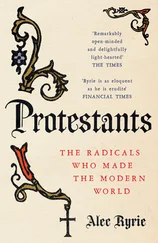Daniel has the feeling he’s not terribly thrilled that he and Andre are there. He watches Andre’s ill mood return in a matter of seconds. “I told you we were fucked,” says Andre, fishing for another cigarette in his vest. “We can’t go forward and we can’t go back.”
Daniel doesn’t react. He wonders what Andre thinks of him. Deadweight? Worse? Maybe he’s so absorbed with what he’s doing that he doesn’t even have an opinion. “All right,” Daniel says. “One day, up and back, that’s it. You get us the ride, militias, whatever, I don’t care. If things look bad out there, I’m turning around, and you can do whatever the hell you want.”
Andre looks at him without expression. If Daniel was looking for approval—was he?—Andre wasn’t going to dole it out that easily. It was possible that he, Daniel, had just traded a trip up-country for absolutely nothing at all.
“You won’t regret this, mate, I promise,” Andre says, flicking his cigarette toward the road. “One day in, one day out.”
Five soldiers are already on the pavement, milling around in the half-light. The APC coughs and shakes and belches smoke behind them. Daniel picks up his knapsack with his notebooks and flashlight and water bottle and slings it over his shoulder while keeping an eye on the captain. He’s walking around sour-faced. The captain climbs onto the APC and it jolts into first gear, then clanks out onto the old asphalt road. Daniel and Andre follow behind it, along with the rest of the soldiers. They’re only five minutes outside of Masiaka, and by the time they’re clustered in the red-dirt plaza, the first rays of the equatorial sun are touching the low brick-and-mortar buildings. They’ve been gutted by five years of war but were once an elegant colonial pink, with stone balustrades overlooking what must have once been the town marketplace. Someone has set up a PKM on a tripod on one of the balconies. Its ugly little barrel pokes out over the square like an admonishing finger.
Fighters emerge by twos and threes, the guys who’ve been left behind to guard the town. They keep their distance from the new arrivals, so Andre walks over to them, and Daniel follows a few minutes later. He takes out his notebook and writes, Destroyed colonial town pink facades a few kids on guard no apparent order . The day is already getting hot, and the sun hasn’t even risen.
“These guys say there’s a big fight going on at a town called Mile 91, on the road to Makeni,” Andre says. He’s snapping photos of the kids while he talks. “I think we should go.”
“What was yesterday like?” Daniel asks, flipping his notebook open. “What was the battle like?”
The kid unleashes a fast, guttural account that is accompanied by chops and slashes with his hands. Daniel barely understands any of it. He writes what he sees: Native fighters with loops of ammunition over their shoulders and leather pouches and feathers and beaded fetishes around their necks .
“They came in last morning and cleared the plaza and killed three rebels,” Andre says. “There were at least two hundred rebels. They’re regrouping up-country. There’s going to be a big fight.”
Daniel scribbles, 200 rebels, three dead . “Is it safe to go up there?”
“Da road dae no’ fine,” the kid says. “So so soljahman, so so rebel.”
“The road’s no good—too many soldiers, too many rebels,” Andre translates.
“What do you think of those guys?” Daniel says, jerking his thumb over his shoulder at the soldiers. The kid spits into the dust. Daniel offers the kid a cigarette, which he takes. He pulls one out for himself but doesn’t light it. It occurs to him that he’s smoking too much. He can quit when this thing’s over with. A few more fighters wander toward them with their guns over their shoulders. Some have sunglasses and some have no shirts and some are barefoot. Most of them have lines of parallel scars on their cheeks that were put in when they were young. Pretty soon there’s a crowd of ten or twelve of them pressed around. Daniel hands out more cigarettes. They’re so young that if it weren’t for the guns, he’d feel like some schoolyard pervert corrupting the neighborhood children. “This is a waste of time,” Daniel says to Andre. “We’re not getting anything.”
“We’re not getting a ride, that’s for sure,” Andre says. He drops his camera back onto the strap around his neck. The kids are starting to lose interest and edge off around the empty plaza. Daniel hasn’t eaten in twenty-four hours and his stomach is a sour mix of bile and cigarettes. He’s starting to think about disengaging from the group and walking back to the APC when he hears the sound of a car engine. Two pickup trucks come around a building from the other side of town, drive through the plaza, and come to a stop in the open. A dozen fighters jump out. They’re from one of the militia groups. The letters CDF are badly painted on the door of one of the trucks: the Civilian Defense Force, a frankly terrifying bunch of lunatics who would probably be attacking Freetown if they hadn’t been bribed into defending it. Daniel can see the captain watching them carefully. “Those guys,” says Andre. “Maybe those guys.”
Even at a distance, the energy coming off them is agitated and ugly; the kids in the square seem to sense it as well. Daniel reluctantly follows Andre over to the trucks. It doesn’t even feel safe to approach them, much less beg a ride to the front, but the fighters barely acknowledge their presence. There’s a dead guy in the back of one of the trucks, but Daniel doesn’t know if he’s a rebel or not. There’s a lot of excited talk. Daniel doesn’t understand much of it—he busies himself writing down what he sees. Local color: it’s better than nothing. Andre finally barges into the conversation. “Mile 91,” he says. “We’re trying to get to Mile 91.”
This prompts a lot of shouting. The CDF commander pulls back the cocking bolt on his machine gun and points the barrel into Andre’s chest. His eyes are blank with an inexplicable rage. “NO, NO,” he screams. “Whatin na’ you name?”
Andre doesn’t flinch. Daniel feels his bowels slide around hotly inside him. “Andre and Daniel,” Andre says. “We’re journalists. We’re hoping to go north.”
All the men seem to have both hands on their guns. The commander screams some more, and the other fighters look around uncomfortably. The sun is barely up and we’re in trouble, Daniel thinks. Andre has his hands up apologetically, and he starts to back up, and Daniel backs up with him, and soon they’re walking back to the APC. The soldiers stare at them when they return. Andre doesn’t say anything, just walks by them to the fresh early-morning shade behind the APC and sits down against one of the oversize tires. “All right, I give up,” he says. “We’ll take the next ride out of here.”
A little while later, the CDF trucks start up and drive off with five or six fighters in the back and more hanging out the windows, rifles and RPGs pointing up into the air. One of them fires off a short burst from his gun, and the shots clatter across the plaza and make everyone jump, even the captain. A sick infusion of adrenaline doesn’t reach Daniel’s system until long after the echoes have died off, and it lingers in his gut for a while like warm poison.
* * *
Their ride comes that afternoon. Andre doesn’t say a word the entire time, and Daniel is just as glad; they sit hungry and silent, watching the road leading west to Freetown. Daniel pretends he has decided to leave Africa—in fact, to leave journalism—to see how it makes him feel, but it doesn’t seem to solve anything. A whole new set of problems appear. What’s more frightening at age thirty: a rebel checkpoint or a job interview for a life you don’t want? Eventually a convoy of trucks appears in the heat-shimmer a mile away, and the soldiers take up positions, because of course there are no radios and no communication, and they have no idea who it is. The trucks turn out to be regular army—four flatbeds filled with soldiers and a Suzuki Samurai sporting a bad camouflage paint job and more soldiers standing up in the back. The trucks chug to a stop in the shade, and the soldiers jump down and start unloading ammunition. Daniel watches the captain walk over to talk with them.
Читать дальше












